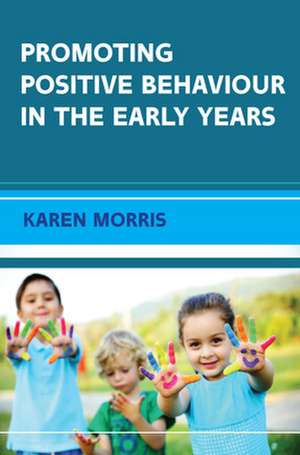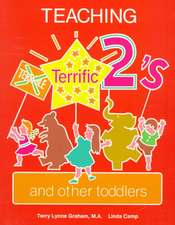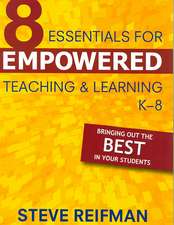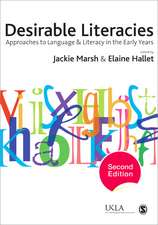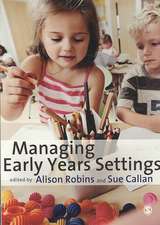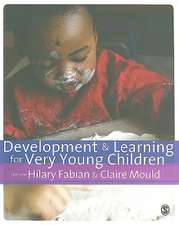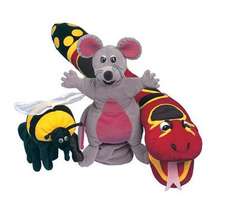Promoting Positive Behaviour in the Early Years
Autor Karen Morrisen Limba Engleză Paperback – 16 iun 2015
The approach also generates constructive ways of addressing unmet needs and considers the child's voice throughout.
With an emphasis firmly on finding ways to promote positive behaviour and to equip you with effective strategies to help the child, the book includes:
- Case snippets to bring the approach and advice to life
- A rich range of helpful strategies
- Consideration of a range of viewpoints, including those of parents and practitioners
- Links with the Early Years Foundation Stage
If you are working or training to work with young children this book has a highly practical emphasis that will help you use theory to devise effective strategies to support children.
Karen Morris is Senior Lecturer and Programme Leader for the foundation degree and undergraduate degree in Childhood Studies at the University of Winchester, UK.
Preț: 234.21 lei
Nou
Puncte Express: 351
Preț estimativ în valută:
44.84€ • 46.78$ • 37.59£
44.84€ • 46.78$ • 37.59£
Carte tipărită la comandă
Livrare economică 13-27 martie
Preluare comenzi: 021 569.72.76
Specificații
ISBN-13: 9780335262984
ISBN-10: 0335262988
Pagini: 184
Dimensiuni: 153 x 231 x 12 mm
Greutate: 0.2 kg
Editura: McGraw Hill Education
Colecția Open University Press
Locul publicării:United Kingdom
ISBN-10: 0335262988
Pagini: 184
Dimensiuni: 153 x 231 x 12 mm
Greutate: 0.2 kg
Editura: McGraw Hill Education
Colecția Open University Press
Locul publicării:United Kingdom
Cuprins
1.Introduction
PART 1 - Relatedness: 'I Belong'
Introduction to Part 1
2.The Value of a Secure Attachment Bond: 'I need to feel safe, special and valued.'
3.Insecure Attachments and Ways to Help: 'Understand that this behaviour started as self-protection'PART 2 - Autonomy: 'Being Me'
Introduction to Part 2
4.Boundary Setting: 'I need to explore and find out about the world and myself within managed boundaries'.
5.Emotions: 'I need to understand my own feelings and how to use them constructively'
6.Unique but Belonging: 'I want to be me but I still need to be loved'
PART 3 -Competence: 'I Can'
Introduction to Part 3
7. How Competence Develops: 'I need to feel I can make a difference'
8.Communication Skills and Behaviour: 'I need to understand and make myself understood'
9.Competence and Executive Functions: 'I need the right sort of opportunities and support to practise skills such as paying attention, waiting and managing impulses'
PART 4 - Collaborating for Positive Behaviour: 'Together we can'
Introduction to Part 4
10.Planning for Positive Behaviour: practitioner viewpoints
11.Planning for Positive Behaviour: parent viewpoints
Glossary
References
PART 1 - Relatedness: 'I Belong'
Introduction to Part 1
2.The Value of a Secure Attachment Bond: 'I need to feel safe, special and valued.'
3.Insecure Attachments and Ways to Help: 'Understand that this behaviour started as self-protection'PART 2 - Autonomy: 'Being Me'
Introduction to Part 2
4.Boundary Setting: 'I need to explore and find out about the world and myself within managed boundaries'.
5.Emotions: 'I need to understand my own feelings and how to use them constructively'
6.Unique but Belonging: 'I want to be me but I still need to be loved'
PART 3 -Competence: 'I Can'
Introduction to Part 3
7. How Competence Develops: 'I need to feel I can make a difference'
8.Communication Skills and Behaviour: 'I need to understand and make myself understood'
9.Competence and Executive Functions: 'I need the right sort of opportunities and support to practise skills such as paying attention, waiting and managing impulses'
PART 4 - Collaborating for Positive Behaviour: 'Together we can'
Introduction to Part 4
10.Planning for Positive Behaviour: practitioner viewpoints
11.Planning for Positive Behaviour: parent viewpoints
Glossary
References
